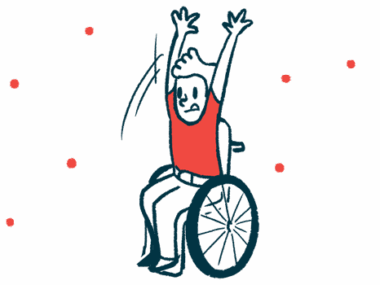In real world, Evrysdi stabilizes, improves motor skills in SMA adults
Nearly all patients 'satisfied' with approved medication after 1 year: Study
Written by |

In a small real-world study that tracked adults with spinal muscular atrophy (SMA) treated with Evrysdi (risdiplam) for more than 18 months, most patients saw their motor function remain stable or even improve.
Nearly all of the study’s participants reported being generally satisfied with the approved SMA medication after one year of treatment, according to a questionnaire.
“Our data indicate that [Evrysdi] is in general well tolerated and somewhat effective,” the researchers wrote, noting that “this is one of the first studies in a real-world setting in adult SMA patients that describes motor function under treatment with [Evrysdi].”
The team, from a single center in Germany, further noted that “stabilization as well as improvement on [the two assessment measures used] should be regarded as treatment success given that natural history studies indicate significant declines of motor function over time.”
The study, “Risdiplam therapy in adults with 5q-SMA: observational study on motor function and treatment satisfaction,” was published in the journal BMC Neurology.
Over 90% of patients remained stable with treatment
Evrysdi is an approved oral disease-modifying therapy that’s indicated for daily use in children and adults with SMA, a progressive neuromuscular disease marked by muscle wasting and weakness. The treatment works by increasing levels of SMN protein, which typically are abnormally low in SMA patients due to inherited genetic defects in the SMN1 gene.
Clinical trials that supported Evrysdi’s approval demonstrated its ability to stabilize or improve motor function and extend survival, especially in younger patients. However, few studies have examined its safety and efficacy in real-world settings with adult patients.
To address this gap, scientists at the Hannover Medical School, in Germany, reported on their experience treating 14 SMA adults with Evrysdi at their neuromuscular center.
The patients ranged in age from 18 to 51. Eight had SMA type 2, which usually is marked by onset between 6 and 18 months of age, and six had SMA type 3, which can start anytime between age 18 months and the end of adolescence. Only one was able to walk without assistance, and all but two had scoliosis, a sideways curvature of the spine common among SMA patients. Five of the patients were receiving noninvasive breathing support.
Before treatment, all of the patients reported a steady decline in motor function since the onset of symptoms. Evrysdi was started at least four months after the last dose of Spinraza (nusinersen), another approved SMA therapy, for five patients. Clinical assessments were performed every four months, with half of the individuals reaching a 20-month follow-up.
Data showed no significant improvements in gross motor function across all patients, as assessed by the Hammersmith Functional Motor Scale Expanded (HFMSE) scale. Still, 12 patients (92%) remained stable. One (8%) showed a steady decline in motor function despite Evrysdi or previous Spinraza treatment, and two (15%) showed transient clinical deterioration.
Four patients experienced meaningful improvements in upper limb function with treatment, as indicated by the Revised Upper Limb Module (RULM). Meanwhile, three remained stable and six deteriorated. Two patients exhibited a transient deterioration at months 12 and 16, while one initially declined at month 12 but later improved by month 20.
Most patients reported being generally satisfied with Evrysdi
Overall, most patients reported being satisfied with the therapy, according to researchers.
“Throughout one year of [Evrysdi] treatment, patients’ ‘global satisfaction’ remained relatively stable and most of the patients reported to be at least ‘somewhat satisfied’ with the medication,” the team wrote.
Specifically, after four months of treatment, seven patients reported that they were “somewhat satisfied” with the medication, with four “very satisfied” or “extremely satisfied,” as measured by the Treatment Satisfaction Questionnaire for Medication.
By month eight, all reported to be at least somewhat satisfied, with three being very satisfied. According to the researchers, all but one patient said they were at least “satisfied” with the medication at month 12. One individual, who remained stable on HFMSE and RULM, was “very dissatisfied” with the treatment.
Throughout one year of [Evrysdi] treatment, patients’ ‘global satisfaction’ remained relatively stable and most of the patients reported to be at least ‘somewhat satisfied’ with the medication.
No treatment withdrawals were reported, and all intended to continue Evrysdi. Transient adverse events occurred in nine patients, and included skin rash and/or increased skin sensitivity to sunlight, diarrhea, canker sores, and abdominal pain. Five patients had mildly elevated liver enzymes, a sign of liver problems, which normalized without treatment.
Finally, no statistical correlations were found between treatment satisfaction and adverse events or a change in RULM/HFMSE scores during Evrysdi therapy.
“[Evrysdi] was well tolerated and motor function remained stable or improved in half of the patients after [Evrysdi] initiation,” the scientists concluded, noting that “patients were generally satisfied with the treatment throughout the analyzed treatment period.”
Part of the reason for the limited data on real-world use of Evrysdi is the therapy’s fairly recent approval in many countries. While it’s now approved in more than 100 countries, its approval in the U.S. was in August 2020. It was approved in Europe, where this study was conducted, in March 2021.
According to the researchers, “larger and multicentric studies are needed in order to draw more relevant conclusions.”





